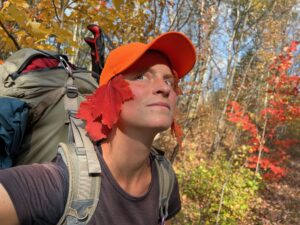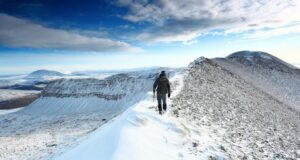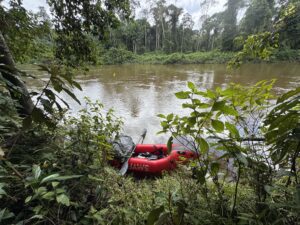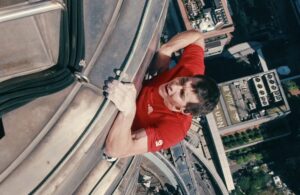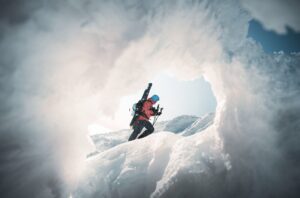
Loncke’s route in 2007 (red) and 2018 (blue). Photo: Louis-Philippe Loncke
Later this week, Belgian explorer Louis-Philippe Loncke will set out from the small town of Penguin, Tasmania and trek through wild forests and across mountains for approximately 400km to the south coast, during the island’s wettest and coldest month.
No stranger to long-distance hiking, Loncke has also traversed the Bolivian salt flats, Iceland and Australia’s Simpson desert, which earned him the European Adventurer of the Year Award in 2016. Yet Tasmania’s network of gorges and off-beaten tracks hold the ultimate challenge for him. When asked about his motivations, he simply replied, “I’m a guy with a bit of a strange brain.”
His first trek, in 2007, was made more difficult due to trench foot, a painful condition caused by long immersion in cold water and mud. After months of recovery, he decided to tackle the route again but in the winter. Eleven years later, he has mustered the experience and motivation for another journey despite his previous difficulties.
His past difficulties with supplies and injuries have influenced his decision to not go unsupported. He will periodically recharge at ranger stations throughout this UNESCO World Heritage Site. His 40 days of supplies include chia seeds, nuts, pasta, whey and other dehydrated food. As fires are illegal in this national park, he will cook on a gas stove and stay warm in a drysuit and winter clothes. He lost 10kg on his first trek; this time, he expects to lose 20kg.

Weight loss and the first stages of trench foot disease in 2007. Photo: Louis-Philippe Loncke
He has a pack raft for water travel and river crossings, a solar panel recharges his batteries and an inReach-type device allows him to communicate with the outside world and update his progress. Overall, he is hefting over 65kg.
His route leads to the Upper Gordon River and through the Gordon Gorge, whose waters become deeper and much more difficult to navigate in the winter. Snow and heavy rainfall will increase the danger. Most people don’t associate Tasmania with snow, but the uplands are prone to heavy dumps at this time of year. Snow hides sharp rocks and other hazards that cause injury. “I believe I will not make it…but we’ll see,” Loncke says flatly.
Unlike his earlier attempt, which was pure physical adventure, this trip has scientific and documentary aspects. He plans to make a film and possibly write a book, but he will also collect data on cognitive responses to stress and isolation. A psychology professor in Paris will measure his speech patterns and memory through his recordings of daily tests. For example, he will recite 100 letters of the alphabet in random order in 50 seconds to determine the impact of stress on the brain.
Nevertheless, the main idea of the trek is to “go as far as possible”. He expects to leave around August 3. Updates can be found on his website: https://www.louis-philippe-loncke.com

